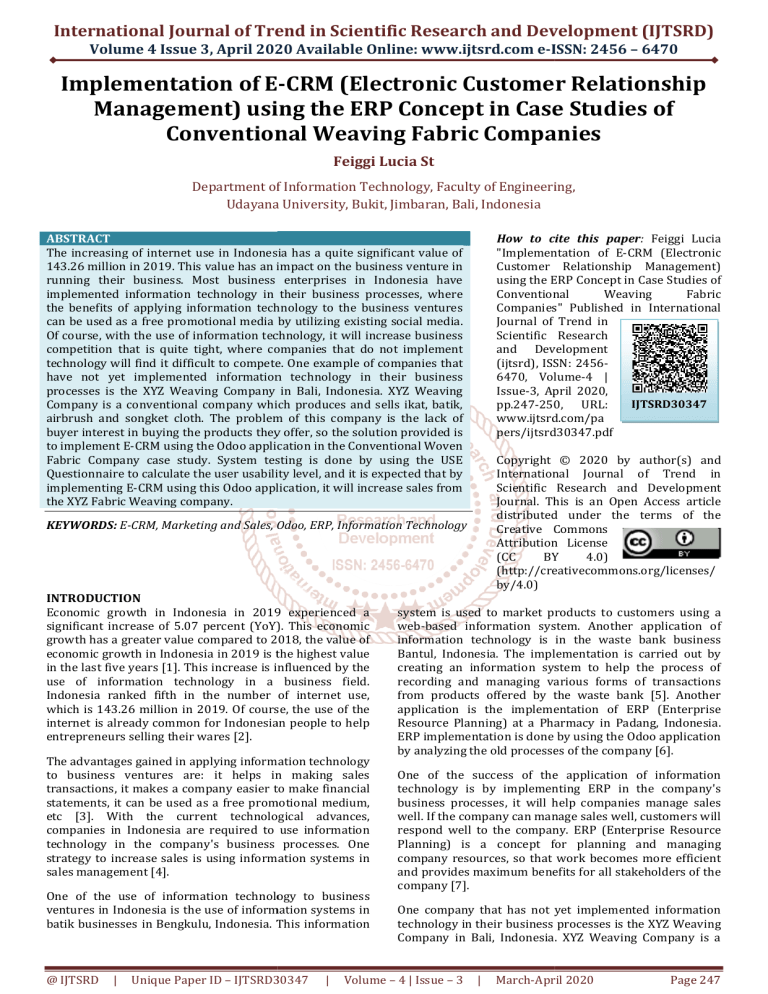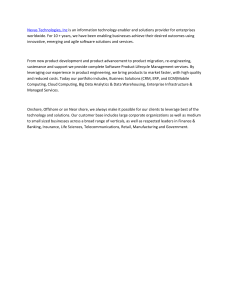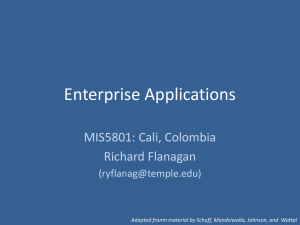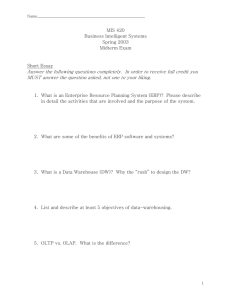
International Journal of Trend in Scientific Research and Development (IJTSRD
(IJTSRD)
Volume 4 Issue 3, April 2020 Available Online: www.ijtsrd.com e-ISSN:
ISSN: 2456 – 6470
Implementation off E
E-CRM (Electronic
lectronic Customer Relationship
Management) using
sing the ERP Concept in
n Case Studies of
Conventional Weaving Fabric Companies
Feiggi Lucia St
Department off Information Technology, Faculty of Engineering,
neering,
Udayana University, Bukit
Bukit, Jimbaran, Bali, Indonesia
ABSTRACT
The increasing of internet use in Indonesia has a quite significant value of
143.26 million in 2019. This value has an impact on the business venture in
running their business. Most business enterprises in Indonesia have
implemented information technology in their business processes, where
the benefits of applying information technology to the business ventures
can be used as a free promotional media by utilizing existing social media
media.
Of course, with the use of information technology, it will increase business
competition that is quite tight, where companies that do not implement
technology will find it difficult to compete. One example of companies that
have not yet implemented information
mation technology in their business
processes is the XYZ Weaving Company in Bali, Indonesia. XYZ Weaving
Company is a conventional company which produces and sells ikat, batik,
airbrush and songket cloth. The problem of this company is the lack of
buyer interest
terest in buying the products they offer, so the solution provided is
to implement E-CRM
CRM using the Odoo application in the Conventional Woven
Fabric Company case study. System testing is done by using the USE
Questionnaire to calculate the user usability llevel, and it is expected that by
implementing E-CRM
CRM using this Odoo application, it will increase sales from
the XYZ Fabric Weaving company.
How to cite this paper: Feiggi Lucia
"Implementation of E-CRM
E
(Electronic
Customer Relationship Management)
using the ERP Concept in Case Studies of
Conventional
Weaving
Fabric
Companies" Published in International
Journal
nal of Trend in
Scientific Research
and Development
(ijtsrd), ISSN: 24562456
6470, Volume-4
Volume
|
Issue-3,
3, April 2020,
IJTSRD30347
pp.247-250,
250, URL:
www.ijtsrd.com/pa
pers/ijtsrd30347.pdf
Copyright © 2020
20
by author(s) and
International Journal of Trend in
Scientific Research and Development
Journal. This is an Open Access article
distributed under the terms of the
Creative Commons
Attribution License
(CC
BY
4.0)
(http://creativecommons.org/licenses/
by/4.0)
KEYWORDS: E-CRM,
CRM, Marketing and Sales, Odoo, ERP, Information Technology
INTRODUCTION
Economic growth in Indonesia in 2019 experienced a
significant increase of 5.07 percent (YoY). This economic
growth has a greater value compared to 2018, the value of
economic growth in Indonesia in 2019 is the highest value
in the last five years [1].. This increase is influenced by the
use of information technology in a business field.
Indonesia ranked fifth in the number of internet use,
which is 143.26 million in 2019. Of course, the use of the
internet is already common for Indonesian people to help
entrepreneurs selling their wares [2].
The advantages gained in applying information tech
technology
to business ventures are: it helps in making sales
transactions, it makes a company easier to make financial
statements, it can be used as a free promotional medium,
etc [3].. With the current technological advances,
companies in Indonesia are required to use information
technology in the company'ss business processes. One
strategy to increase sales is using information systems in
sales management [4].
One of the use of information technology to business
ventures in Indonesia is the use of information systems in
batik businesses in Bengkulu,
ngkulu, Indonesia. This information
@ IJTSRD
|
Unique Paper ID – IJTSRD30347
30347
|
system is used to market products to customers using a
web-based
based information system. Another application of
information technology is in the waste bank business
Bantul, Indonesia. The implementation is carried out by
creating an information system to help the process of
recording and managing various forms of transactions
from products offered by the waste bank [5]. Another
application is the implementation of ERP (Enterprise
Resource Planning) at a Pharmacy in Padang, Indonesia.
ERP implementation is done by using the Odoo application
by analyzing the old processes of the company [6].
One of the success of the application of information
technology is by implementing ERP in the company's
business processes, it will help companies manage sales
well. If the company can manage sales well, customers will
respond well to the company. ERP (Enterprise Resource
Planning)
lanning) is a concept for planning and managing
company resources, so that work becomes more efficient
and provides maximum benefits for all stakeholders of the
company [7].
One company that has not yet implemented information
technology in their business processes is the XYZ Weaving
Company in Bali, Indonesia.
nesia. XYZ Weaving Company is a
Volume – 4 | Issue – 3
|
March-April
April 2020
Page 247
International Journal of Trend in Scientific Research and Development (IJTSRD) @ www.ijtsrd.com eISSN: 2456-6470
conventional company which produces and sells ikat,
batik, airbrush and songket cloth. XYZ Weaving Company
encountered an obstacle that was the lack of customers
who want to buy products from the XYZ Weaving
company. So, the solution given was to implement E-CRM
by using the Odoo application in the Conventional Woven
Fabric Company case study. It is hoped that implementing
ERP with the Odoo application will help XYZ Weaving
companies in increasing revenue, productivity and
visibility in business.
RELATED WORKS
Research conducted by Herry Irawan, Irwan Syah entitled
Evaluation of Implementation of Enterprise Resource
Planning Information System with DeLone and McLean
Model Approach, discusses the testing of ERP systems
(Enterprise Resource Planning) at PT. Telkom Indonesia
Tbk, which in this study, they use the DeLone and McLean
Model Approach [8].
Research conducted by Natalia Limantara, Fredy Jingga
entitled Open Source ERP: ODOO Implementation at Micro
Small Medium Enterprises, uses qualitative methods and
conducts surveys and interviews directly on SMEs. The
results obtained from this study are the implementation of
ERP Odoo in the production and purchasing modules [9].
Fig1. is a flow of research methodology that has 6
processes, namely problems identification used to
determine the problem to be analyzed again, then conduct
a literature study to find the right solution by finding
solutions from reliable sources such as books and journals
related to ERP implementation, then conduct observations
and interviews directly to the company that will be used
as a case study, then conduct a business process reengineering to improve the company's business processes,
and proceed with ERP implementation using the Odoo
application in the marketing and sales modules, and CRM,
then the last process is testing the system to check
whether the implementation is feasible to be used by the
company or not.
THEORETICAL FRAMEWORK
Literature studies that is used as a reference in
implementing E-CRM using the Odoo application with a
case study of Conventional Weaving Fabric companies are
as follows.
1. ERP (Enterprise Resource Planning)
The Enterprise Resource Planning (ERP) system is a core
software program used by companies to integrate and
coordinate information in each business area [7].
Research conducted by Yolanda Trinoverly entitled
Analyzing the Benefits of ERP Implementation in
Developing Country: A State Owned Company Case Study,
shows the analysis carried out in this study has the aim of
knowing how successful the use of ERP is in a company
[10].
2. CRM (Customer Relationship Management)
CRM is a strategy that companies need to optimize profits
by increasing customer satisfaction. It also showed
empirical evidence that companies that effectively
implement CRM, as a business strategy, are likely to
become market leaders [11].
RESEARCH METHOD
The research methodology entitled "Implementation of ECRM by Using Odoo Applications in the Conventional
Weaving Fabric Business" can be seen in Fig 1.
3. Odoo
Odoo or previously is called OpenERP is an ERP
application that has a modern and complete design that is
distributed by open source. This ERP application has
various business application programs including Sales,
CRM, Project Management, Warehouse Management,
Manufacturing, Finance and Accounting, Human
Resources, and so on [11].
4. USE Questionnaire
Usability measurement is done by using a series of
questionnaires that can process data related to
effectiveness, efficiency, and satisfaction in the use of an
information system. The USE Questionnaire (Usefulness,
Satisfaction, and Ease of Use) is a method of measuring
usability using a questionnaire package proposed by Lund
[12].
RESULT AND DISCUSSION
Analysis conducted on the implementation of E-CRM by
using the Odoo application in the XYZ Conventional Woven
Fabric Company case study is by conducting a business
process re-engineering which can be seen in the SOP as
follows.
1. Business Process Re-Engineering
The business process re-engineering carried out in the ECRM implementation research using the Odoo application
with a Conventional Weaving Fabric Comapany case study
are as follows.
Fig1. Research methodology
@ IJTSRD
|
Unique Paper ID – IJTSRD30347
|
Volume – 4 | Issue – 3
|
March-April 2020
Page 248
International Journal of Trend in Scientific Research and Development (IJTSRD) @ www.ijtsrd.com eISSN: 2456-6470
Figure 3. is a display of SOP for ordering products after the
SOP improvements, where to place an order, the
customers will get a quotation after they make a product
order. If the customer approves the quotation that is
made, then the quotation will automatically be converted
into a sales order, then the administration will carry out a
confirmation
ation sale process and the customer will make a
product order payment. If the product has been paid, the
administration will immediately process the delivery
order.
Fig2. Research methodology
Fig 2. is a display of ordering products SOP at the company
before the business process re-engineering
engineering applied. The
ordering products was done conventionally, means that
the customer makes an order directly to the company then
the administration will check the prod
product in the
warehouse, if the stock is still available then the
administration will be directly make an invoice and
immediately send the product according to the order, and
if the stock is not available then the administration will
immediately contact the manufacturing
anufacturing department to
make the product and when the product is finished, it will
be sent directly to the customer.
Fig4. CRM SOP After Implementation
Figure 4. is a CRM SOP after ERP implementation using
usin the
Odoo application, where the company manager will set
sales achievement targets and then the sales will make an
official report containing customer data, products sold,
estimated product sales prices, and estimated successful
sales, then the sales willl also schedule meetings with
customers to discuss the offers sent, and the sales will also
record the success of offers received by customers.
2. Application Results
The results of the application after the business process
re-engineering
engineering in implementing ERP
ER using the Odoo
application in the marketing and Sales module is
conducted are as follows.
Fig3. SOP for Ordering After Implementation
@ IJTSRD
|
Unique Paper ID – IJTSRD30347
30347
|
Fig5. Leads Making
Volume – 4 | Issue – 3
|
March-April
April 2020
Page 249
International Journal of Trend in Scientific Research and Development (IJTSRD) @ www.ijtsrd.com eISSN: 2456-6470
Fig 5. is leads making on the CRM submodule in the Odoo
application, where the function of making leads is to make
a planning target that will be carried out by the sales
department with the customer.
𝐸𝑎𝑠𝑦 𝑜𝑓 𝐿𝑒𝑎𝑟𝑛𝑖𝑛𝑔 =
𝑆𝑎𝑡𝑖𝑠𝑓𝑎𝑐𝑡𝑖𝑜𝑛 =
150
𝑥 100 = 75
(10𝑥4)5
300
𝑥 100 = 85,71
(10
(10𝑥7)5
Calculation of the usability level of each parameter; the
usefulness parameter has a value of 58.7 which is declared
as quite feasible; then, the easy of use parameter has a
value of 72.73 which is declared as feasible; then, the easy
of learning parameter has a value of 75 which is declared
as feasible; and satisfaction parameter has a value of 85.71
which is declared as very feasible.
Fig6. Achievement Targets Making
Fig 6. is the making of achievement targets in the CRM
submodule by using the Odoo application, which has a
function to create the sales achievement targets.
Fig7. Pipeline
Fig 7. is a display of the pipeline of the CRM submodule in
the Odoo application, which has a function to display a
form of activities to be carried out next by the sales
department.
3. System Testing
System testing carried out in the analysi
analysis of the
implementation of E-CRM
CRM using the Odoo application with
a case study of a Conventional Weaving Fabric company is
using the USE Questionnaire method. System testing in
this study was carried out by distributing questionnaires
to 10 XYZ Conventional Weaving Fabric Company
employees consisting of 5 Sales employees and 5
Administration employees. The formula used to calculate
the results of the questionnaire are:
𝑠𝑢𝑚
𝑈𝑠𝑎𝑏𝑖𝑙𝑖𝑡𝑦 =
𝑥 100
𝑐𝑜𝑢𝑛𝑡 𝑥 𝐿𝑖𝑘𝑒𝑟𝑡 𝑠𝑐𝑎𝑙𝑒
Information: Sum = the total number of respondents in the
questionnaire
Count = (number of respondents x number of statements)
Likert scale = the highest Likert score
So, for the calculation of the usability level on the
parameters of usefulness, easy of use, easy of lea
learning, and
satisfaction, can be seen below:
235
𝑈𝑠𝑒𝑓𝑢𝑙𝑛𝑒𝑠𝑠 =
𝑥 100 = 58,7
(10𝑥8)5
400
𝐸𝑎𝑠𝑦 𝑜𝑓 𝑈𝑠𝑒 =
𝑥 100 = 72,73
(10𝑥11)5
@ IJTSRD
|
Unique Paper ID – IJTSRD30347
30347
|
CONCLUSION
The conclusion of the study entitled "Implementation of EE
CRM Using ERP Concepts in Conventional Weaving Fabric
Companies" is XYZ Weaving Company has problems in
selling products that do not reach the target so that the
implementation of E-CRM
CRM using the Odoo application is
used. The steps undertaken are conducting business
processes re-engineering,
engineering, then immediately implementing
it into
nto the Odoo application. The results of system testing
were carried out using the USE Questionnaire which was
declared very feasible with a value of 85.71.
REFERENCES
[1] Kementrian Bappenas “Perkembangan Ekonomi
Indonesia dan Dunia,” 2019 .
[2] K. Riset and D. A. N. P. Tinggi, “Lanskap Ilmu
Pengetahuan dan Teknologi di Indonesia.”
[3] K. Alaqeel et al.,, “Configurations and implementation
of payroll system using open-source
open
ERP: a case
study of Koperasi PT Sri Configurations and
implementation of payroll system using open-source
open
ERP:: a case study of Koperasi PT Sri,” 2017.
[4] F. Language,
anguage, “The Advantages of Using Technology
â€TM in Second Language Educat â€
â TM ion,” no. May,
pp. 38–43, 2005.
[5] M. Studi, K. Bank, S. Gemah,
Ge
and R. Badegan, “Pada
Usaha Kecil Menengah ( Studi Kasus Bank Sampah
Gemah Ripah,” no. December 2014, 2017.
[6] R. Akbar et al.,, “Jurnal TEKNOIF ISSN : 2338-2724
Implementasi Enterprise Resources Planning ( Erp )
Untuk Sistem Informasi Pembelian , Penjualan
Penjual Dan
Persediaan Vol . 3 No . 2 Oktober 2015 Jurnal
TEKNOIF ISSN : 2338-2724,”
2724,” vol. 3, no. 2, pp. 29–40,
29
2015.
[7] F. F. Nah, Planning Solutions & Management.
Management
[8] H. Irawan, “Evaluation of Implementation of
Enterprise Resource Planning Information System
with DeLone
one and McLean Model Approach,” vol. 0,
no. c, 2017.
[9] N. Limantara and F. Jingga, “Open Source ERP : ODOO
Implementation at Micro Small Medium Enterprises,”
no. November, pp. 340––344, 2017.
[10] Y. Trinoverly, “Analyzing The Benefit of ERP
Implementation in Developing
Deve
Country : A State
Owned Company Case Study,” 2018 Int. Conf. Inf.
Manag. Technol.,, no. September, pp. 1–9,
1
2018.
[11] Ellen Monk, "Concepts In Enterprise Resource
Planning," 2013.
[12] V. Sahfitri and M. Ulfa, “Pendukung Proses
Pembelajaran Di Perguruan Tinggi
Tingg Menggunakan Use
Questionnaire,” pp. 53––66.
Volume – 4 | Issue – 3
|
March-April
April 2020
Page 250



